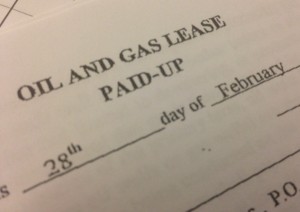State senate panel approves oil and gas royalty bills
-
Marie Cusick

Marie Cusick/StateImpact Pennsylvania
A state senate committee has approved two bills that would offer more protections for landowners receiving royalty money from oil and gas companies.
A state senate committee has approved a pair of bills that would provide more protections for people who receive royalty money from oil and gas drilling.
The Senate Environmental Resources and Energy Committee unanimously approved SB 147 and SB 148 at a meeting Wednesday. SB 147 would require drillers to disclose more information on royalty check stubs. It would also grant landowners the right to inspect companies’ records to ensure proper payment.
SB 148 would bar oil and gas companies from retaliating against people who raise questions about their royalty payments.
Jackie Root heads the Pennsylvania chapter of the National Association of Royalty Owners (NARO-PA), which advocates on behalf of people who have leased their land for drilling. She thinks both bills are helpful.
“Senate Bill 147 covers some important issues for us and lays out some requirements for reporting,” she says. “Especially the right to audit. If you don’t have that in your lease, it’s pretty clear companies won’t grant you the right to audit.”
SB 147 also requires drillers to clearly report joint ventures. The partnerships allow multiple companies to withdraw different amounts of gas from the same well and pay out different amounts of money to landowners.
“That is very important because these joint ventures just complicate some royalty checks to the nth degree,” says Root. “So being able to reconcile that is extremely important.”
Sen. Gene Yaw (R- Bradford) is the prime sponsor of both royalty bills. He notes that most the payment complaints have focused around a few companies but believes the new rules are still important for the whole industry.
“It’s like any law we make,” says Yaw. “The majority of people obey the speed limit, but it applies to all of us.”
Pennsylvania’s largest gas industry trade group, the Marcellus Shale Coalition, did not take a position on either bill.
“However, the Coalition supports reasonable disclosure to leaseholders and will continue to work with the general assembly to address any real or perceived issues,” says MSC spokesman Patrick Creighton.
NARO-PA’s main focus is on a more controversial piece of royalty legislation. HB 1684 would limit the ability of oil and gas companies to charge landowners the fees associated with processing and transporting gas. A number of landowners have complained some drillers are fraudulently charging exorbitant fees– leaving them with little to no royalty money.
The gas industry has lobbied heavily against the measure, arguing it’s unconstitutional because it would change the terms of existing contracts. Yaw says he did not want to tackle that issue in the Senate but will support it if it’s approved by the House.
“There are several thousand contracts that have been out there for five or 10 years,” says Yaw. “To go back and say we’re going to change how those contracts are interpreted– that’s a significant legal issue. If the House can run that bill and clean it up, we’ll support it.”
The senate committee also unanimously approved a third bill Wednesday that would create an advisory council to the state Department of Environmental Protection to help it handle the differences in regulation for conventional and unconventional drilling. All three measures now move to the full senate for consideration.
















